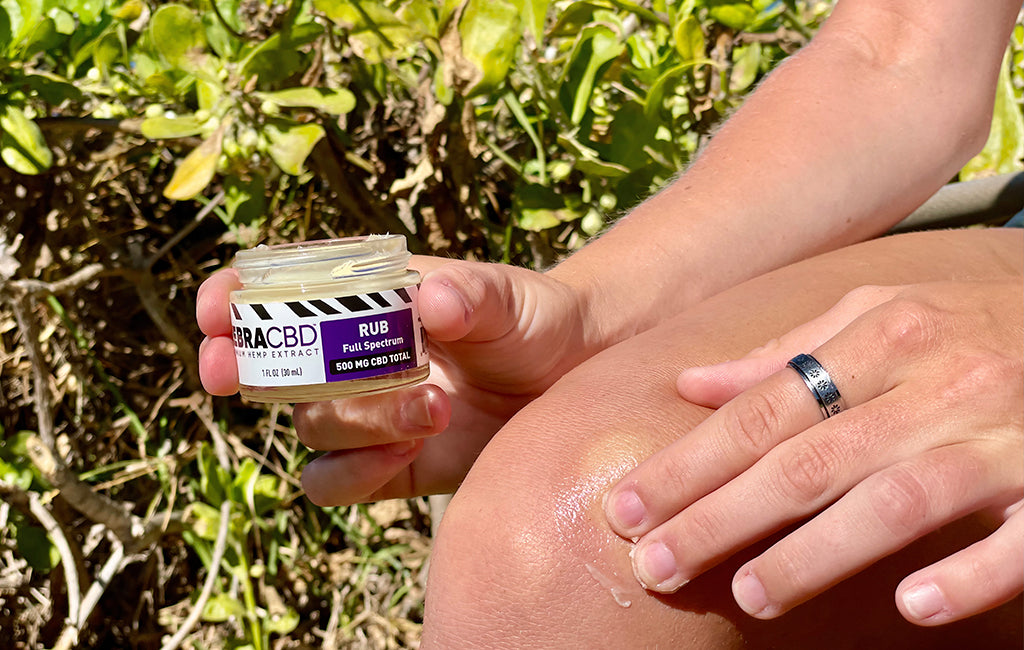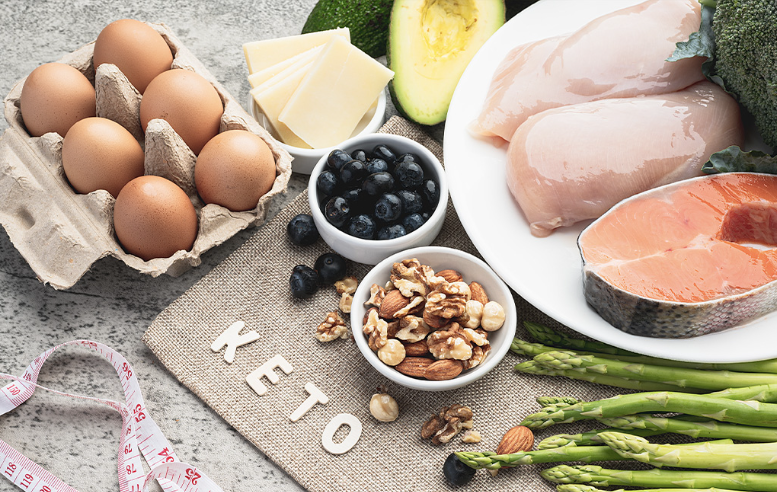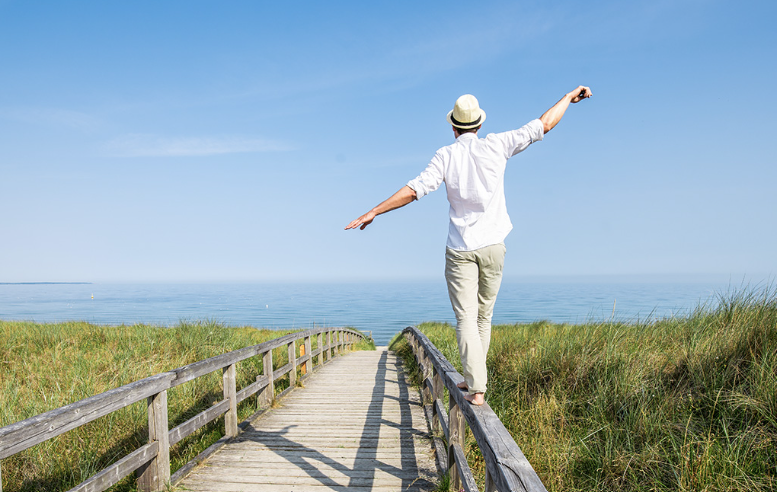
A sweat-induced workout at the gym is usually a rewarding experience: You walk away feeling accomplished, strong and motivated for the days to come. Unfortunately, the hours following often don’t feel as great.
Exercise, especially activities that are highly strenuous, can cause muscles and joints to become sore and stiff, respectively. As a result, your post-workout recovery can look a lot like hobbling from room to room — and avoiding lifting any particularly heavy objects.
One of the key ways CBD may aid in exercise recovery is by reducing inflammation.
All that said, implementing an effective recovery routine is critical to maintaining your overall health and meeting your fitness goals. While this should involve giving your body plenty of hydration and nutrition, different types of CBD may also play a role in enhancing your post-workout recovery.
The Inside Scoop Into Your Post-Workout Body
As you run your 5K or lift those 50-pound dumbbells, your body adapts to meet its present needs. Blood is diverted to the skeletal muscles, hormones direct the body to convert fat into energy-producing glucose and, in the absence of high levels of oxygen, muscles break down glucose for energy — and produce lactate as a byproduct.
While many believe that lactic acid is the reason for muscle soreness, it’s not true. The actual culprit is lactate.
Lactic acid actually cannot exist within our bodies, thanks to our high blood pH levels. Instead, the water in our bodies breaks lactic acid into two parts: lactate and hydrogen. Lactate is what’s responsible for the burning sensation often felt during exercise, as well as post-workout muscle fatigue and soreness.
Muscle soreness can also be a result of microtears in the muscles, which are actually essential to muscle growth. As the body heals, the muscles become stronger. That said, giving your body enough time to rest and recover is essential.
During workout recovery, blood circulation also increases, which helps to remove waste products and deliver much-needed nutrients to soft tissues. This helps to rebuild:
- Muscles
- Tendons
- Ligaments
CBD: Your Post-Workout Aid
CBD and exercise recovery may go hand-in-hand. CBD, or cannabidiol, is a cannabinoid that comes from the Cannabis sativa plant. Unlike its cousin, tetrahydrocannabinol (THC), it’s non-psychoactive and is very unlikely to show up on a pre-competition drug test.
Rather, CBD is a hemp derivative that can provide a host of benefits, including to athletes looking to boost their recovery period.
CBD and Inflammation
One of the key ways CBD may aid in exercise recovery is by reducing inflammation. Intense physical activity can lead to muscle inflammation, which is a natural response to the stress placed on muscles during workouts. While inflammation is a necessary part of the muscle recovery process, excessive or prolonged inflammation can impede muscle recovery and lead to discomfort and decreased performance.
Studies have shown that CBD possesses anti-inflammatory properties through its interactions with the endocannabinoid system (ECS) in the body. The ECS plays a vital role in regulating various physiological processes, including immune responses and inflammation. CBD mimics the body’s naturally occurring endocannabinoids and can interact with ECS receptors, such as CB1 and CB2 receptors, to modulate the inflammatory response, potentially helping to reduce exercise-induced inflammation.
CBD and Soreness
Post-workout soreness, known as delayed onset muscle soreness (DOMS), is a common side effect of intense exercise, especially when starting a new workout routine or engaging in high-intensity training.
DOMS typically peaks within 12 to 24 hours after exercise and can cause discomfort and stiffness. Fortunately, CBD's potential analgesic properties can help alleviate post-workout soreness. Studies have indicated that CBD may influence the perception of physical discomfort by interacting with the associated receptors in the brain and nervous system. By reducing aches and discomfort, CBD can improve post-workout recovery and allow individuals to perform better in their following training sessions.
CBD and Muscle Repair
Muscle repair and growth occur during the recovery phase after exercise, and adequate recovery is essential for muscles to repair microtears that occur during workouts, leading to stronger and more resilient muscle fibers.
CBD may support muscle repair through its potential impact on sleep and stress levels.
Quality sleep is crucial for recovery, and CBD has been linked to improved sleep patterns in some individuals. Additionally, CBD's anxiolytic (stress-relieving) properties may help reduce exercise-induced stress, which can impede the recovery process.
How to Incorporate CBD into Your Fitness Routine
As an athlete, you’re likely well aware of the significance of nurturing your body for optimal wellness, and the same principle applies when considering CBD products. Overall, you’ll want to adhere to the following protocols when adding a CBD product to your day-to-day:
- Choose high-quality CBD – When searching for a CBD product that works for you, prioritize CBD brands that provide third-party lab test results, often through a Certificate of Analysis (COA). This document will verify the product’s quality, potency and ingredients, as well as the absence of certain toxins and contaminants, such as pesticides, herbicides, fungicides and heavy metals. You’ll also want to look for products made with high-quality hemp extract.
- Find the optimal dosage – CBD will affect every athlete differently depending on weight and metabolism. As such, it’s generally advised to start at a low CBD dosage and gradually increase your intake as you learn how CBD impacts your body. Currently, there are no dosage recommendations per the United States Food and Drug Administration (FDA); however, most studies have included dosages of 20 to 1,500 milligrams daily.
- Determine a delivery method – The world of CBD is bountiful, and you can find a myriad of CBD products, such as CBD hemp oil for sale, capsules or hemp pills, CBD topical and CBD edibles. Generally, topical CBD creams and sublingual oils are believed to have the quickest absorption rates if you’re looking for fast-acting relief. On the other hand, CBD edibles like CBD gummies for sale must bypass the digestive system before entering the bloodstream.
- Understand timing – To maximize the benefits of CBD for exercise recovery, consider taking it shortly after your workout. This allows the CBD to work with your body's natural recovery processes during the crucial post-workout period.
- Combine CBD with other recovery strategies – While CBD may support exercise recovery, it should be part of a comprehensive recovery routine that includes proper nutrition, hydration, stretching and rest. You can also use CBD oil for a relaxing massage, add it to a post-workout smoothie, infuse it into a restorative bath or add it to your bedtime routine to help improve your sleep.
CBD and Exercise Recovery FAQ
If you’re new to CBD, it may be daunting to add the cannabinoid to your exercise routine. Fortunately, we’re here to provide clarity and guidance to help you make informed decisions based on your unique fitness goals and health status.
1. Will CBD make me feel high or impaired during workouts?
Does CBD oil get you high? CBD is non-psychoactive and does not produce the "high" feeling commonly associated with THC, another compound found in cannabis.
When derived from hemp, CBD contains less than 0.3% THC, which is insufficient to cause any intoxicating effects. This means that CBD will not impair your cognitive or motor functions or affect your performance, making it a safe addition to your fitness routine.
2. Is CBD legal for athletes?
Federally, CBD is legal within the United States, as long as it contains less than 0.3% THC. In 2018, CBD was removed from the World Anti-Doping Agency (WADA) list of prohibited substances, allowing athletes to use it freely.
That said, it’s essential to check the regulations of your sports organization or athletic facility to ensure its rules and policies allow CBD usage and ensure you remain compliant with anti-doping rules.
3. What are the potential side effects of CBD?
Generally, CBD is well-tolerated by most people, and there are limited reported side effects. However, this will greatly depend on individual body composition and preferences. All that said, there have been some reports of:
- Fatigue
- Diarrhea
- Changes in appetite
- Dry mouth
The good news? These symptoms are typically temporary and mild in nature. However, if you are experiencing adverse effects, it’s critical to speak to a healthcare provider who can walk you through proper dosage and identify whether or not CBD may interact negatively with any medications you may be taking.
4. Can CBD be taken alongside supplements and medications?
CBD has the potential to interact with certain medications due to its influence on liver enzymes which are responsible for metabolizing drugs.
If you’re taking other medications, especially ones processed by the liver, it's crucial to consult with your healthcare provider before using CBD. They can help assess potential interactions and ensure your safety while using CBD in conjunction with other supplements or medications.
5. How often can I use CBD for exercise recovery?
The frequency with which you can use CBD for anti aging or for recovery will depend on your individual needs and fitness routine. While some athletes may find it beneficial to use CBD daily, others may only use it during times of extreme muscle soreness or after particularly intense training sessions.
That said, listen to your body, and determine your CBD needs from there. You can always increase or decrease your dosage as needed.
Enhance Your Recovery With Zebra CBD
Athletes and gym-goers know: Effective post-workout recoveries are critical to meeting your fitness goals and taking care of your body. When incorporated into your recovery routine, CBD may help repair and renew your muscles, supporting muscle soreness, inflammation and repair.
At Zebra CBD, we provide a bevy of CBD topicals to enhance your physical recovery. For on-the-spot pain relief, try our full-spectrum CBD Rub, CBD Balm or CBD Roll-On Relief. Each product is made with high-quality hemp extract that can provide fast-acting results — no matter where your fitness routine takes you.
Source:
Healthline. Is It Possible to Get Rid of Lactic Acid in Your Muscles? https://www.healthline.com/health/how-to-get-rid-of-lactic-acid
BBC Science Focus. What happens to my body when I exercise? https://www.sciencefocus.com/the-human-body/what-happens-to-my-body-when-i-exercise/
UC Health. Rest and recovery are critical for an athlete’s physiological and psychological well-being. https://www.uchealth.org/today/rest-and-recovery-for-athletes-physiological-psychological-well-being/
Muscle and Fitness. CBD and Muscle Recovery. https://www.muscleandfitness.com/anti-aging/recovery/cbd-and-muscle-recovery/
Men’s Health. Considering CBD For Muscle Recovery? Here’s What You Need To Know. https://www.menshealth.com/health/a26467604/cbd-for-inflammation-muscle-recovery/
ScienceDirect. How does sleep help recovery from exercise-induced muscle injuries? https://www.sciencedirect.com/science/article/abs/pii/S1440244021001328
Sleep Foundation. CBD as a Sleep Aid. https://www.sleepfoundation.org/sleep-aids/cbd-for-sleep
Healthline. What Is Delayed Onset Muscle Soreness (DOMS) and What Can You Do About It? https://www.healthline.com/health/doms
Healthline. CBD Dosage: Figuring Out How Much to Take. https://www.healthline.com/health/cbd-dosage#how-much-to-take
WADA. 2023 Prohibited List. https://www.wada-ama.org/sites/default/files/2022-09/2023list_explanatory_list_en_final_26_september_2022.pdf









